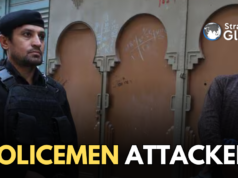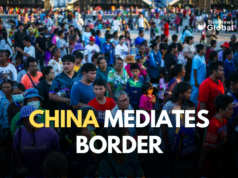India and the US have fast-tracked negotiations for a Bilateral Trade Agreement (BTA) in goods by August-September, however, both sides may face a serious stumbling block in negotiating more market access for agricultural products – an issue that is a political hot potato in both capitals, according to Lisa Curtis, a former US National Security Council (NSC) official under Trump’s first tenure.
Speaking exclusively to StratNews Global in New Delhi over the weekend, Curtis said despite Trump’s tariff whip on India and the others, New Delhi has played its cards well.
“I think in terms of President Trump’s global tariffs, India is actually ahead of the game in terms of the trade talks,” Curtis, currently Senior Fellow and Director, Indo-Pacific Security Programme at Washington-based Center for a New American Security said.
She added that India had already decided to reduce tariffs on some American goods even before Prime Narendra Modi visited the US in February and met President Trump.
On April 2, which President Trump proclaimed as ‘Liberation Day’, the US imposed sweeping tariffs with a minimum benchmark of 10 percent on all imported goods, followed by higher tariffs on a range of countries, including India. While China has hit back with 125 percent tariffs, New Delhi has chosen to remain silent.
“Prime Minister Modi knows President Trump … He dealt with him for four years during his first term. The US and India had tried to negotiate a trade deal. At that time it didn’t happen. But I think that the Indian government realised that, this Trump term would be different, that they would have higher expectations of India on the tariff issue,” said Curtis, who coordinated US-India defence, diplomatic and trade partnership policies for South and Central Asia from 2017 to 2021.
During Trump’s first tenure, India and the US had planned to sign a comprehensive trade deal even though there were issues about India’s trade surplus. Both sides even agreed to sign a “mini trade deal” of sorts at that time but nothing fructified and the trade talks fell apart just before Trump headed for the 2020 US presidential elections.
According to Curtis, this time though India has to come up with “something more” than what was offered to the US back in 2020.
“What I will say is that in the first Trump term, negotiations had been happening. But President Trump got frustrated and he actually revoked India’s GSP trade privileges in 2019,” she said.
“But negotiations continued and even during President Trump’s visit to India in 2020, they were still negotiating. And India then at that point put on the table a mini trade deal, which President Trump ultimately rejected. So my sense is that this new deal will have to be more than maybe what was put forward in the mini trade deal,” she added.
This time around Curtis feels “The Indians played it smartly.”
“They came in and tried to preemptively reduce tariffs, to create some goodwill with President Trump. And I think it helped and, immediately launched into fast track trade negotiations after Prime Minister Modi’s visit to Washington. The trade officials have been going back and forth between the capitals, negotiating furiously,” she highlighted.
Curtis, therefore thinks, there is a “better chance” for India and the US to conclude the BTA before Washington clinches any other trade pact with other countries.
However, Curtis did caution that the US and India might face a significant stumbling block over US agricultural products.
“India is very aware of what President Trump is looking for in terms of reducing tariffs and is pretty much willing to meet the United States halfway on these issues. I think the one issue where there could be some friction is on agricultural issues. I think that’s a real red line for Prime Minister Modi,” she underscored.
She stressed, “Almost 50 percent of the Indian population works in the agricultural sector. It’s politically hot and sensitive issue. So I think, you know, that’s the one area where we may see a bit of friction because it’s also an important sector for the United States as well. And so I think that’s the real test, can they work through their differences over the issue.”
Indo-Pacific & Securitising Quad
On the question of the second Trump administration’s focus on the Indo-Pacific strategic framework and the Quad, Curtis said the new US government has already set the ball rolling with the visit of the Japanese Prime Minister to the US, Secretary of State Marco Rubio hosting the Quad foreign ministers meeting on the first day of the government and the subsequent visits by the US Defence Secretary to countries that are key in the Indo-Pacific.
“We also have heard about the Interim Defence Strategic Guidance. It’s a classified document that’s circulating in the Defence Department, but parts of it have been leaked to the Washington Post…And it sounds like there’s a very strong focus on defending Taiwan, on making sure that the US, increases its military posture, its military troop levels, stockpiling, weapons in the region and working with allies and partners to deter China from taking military action toward Taiwan in the South China Sea,” said Curtis.
“So to me that sounds like a lot of continuity from both the first Trump administration’s Indo-Pacific strategy through the Biden administration strategy. I think we see a lot of continuity there,” she added.
However, she said seeing President Trump’s stance on the Russia-Ukraine war, Taiwan is increasingly getting concerned that the US “could potentially withdraw support from Taiwan or put Taiwan on the negotiating table in his desire to get a trade deal with China.”
But she also said that the US Congress supports Taiwan overwhelmingly.
On Quad, she said there’s “definitely a commitment”: the first Trump tenure witnessed the revival of the grouping in 2021.
“I think we’ll see the agenda pared down to some of those really critical issues like, maritime security, technology cooperation, critical minerals…There may be a push to talk more about military issues, planning for a potential crisis or contingency in the Pacific region. But I think India would resist, making the Quad more of a security or defence forum, at least publicly,” she averred.
She said India would resist such an effort in order to not to “provoke” China resulting in another border standoff like the one that began in 2020.
“There may a bit of a push from the Trump administration to securitise the Quad more and make it more focused on military issues. I expect India will continue to resist that. And, you know, we can’t have the Quad without India. So India’s views will have to be respected.”
On the recent rapprochement between India and China, she said, “As long as India isn’t sacrificing any of its territory or allowing China to coerce, intimidate, which I don’t think is happening, I think India has stood its ground in terms of its position that it would not want to normalise relations with China until Chinese troop positions return to the status quo ante in May 2020. So I think as long as China’s not able to change facts on the ground through military force, the U.S would be supportive.”
26/11 Conspirator Headley’s Extradition
Earlier this month, Tahawwur Rana, a 64-year-old Canadian businessman of Pakistani origin, was extradited to India from the United States.
Rana is one of the primary accused in the 26/11 Mumbai terror attacks and is charged with facilitating frequent visits to Mumbai by David Coleman Headley, the main facilitator of the attacks. Currently in custody and being questioned, Rana’s extradition has raised questions regarding the potential extradition of Headley to India as well.
“I don’t think so (Headley’s extradition). He’s in a different category. He made a plea deal with the United States. So in our court system, that is not something that you can change or overturn,” said Curtis.
“So I don’t think that discussion will happen. That’s my sense. Of course, the U.S. and the counter-terrorism partnership will remain strong. They’ll find other ways to cooperate. And I’m sure this will be a priority for the Trump administration. But I don’t think we can infer that because Tahawwur Rana was extradited, David Headley would happen to be next. I think that’s a much different issue,” she said.




